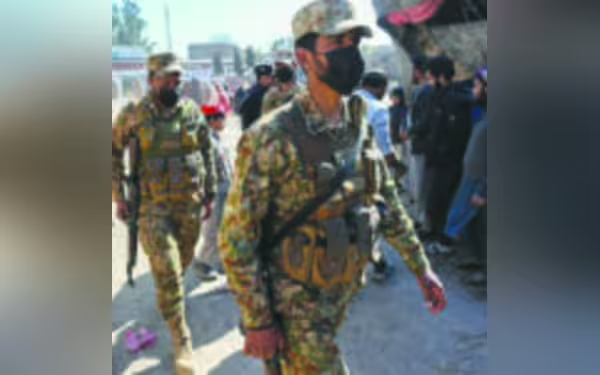Saturday, November 16, 2024 05:43 PM
Baluchistan Crisis: Government Struggles Amid Rising Insurgency
- Over 70 killed in recent Baluchistan attacks.
- BLA claims responsibility, showcasing growing influence.
- Government faces criticism over personnel shortages.
 Image Credits: pakistantoday
Image Credits: pakistantodayThe Baluchistan crisis escalates as violent attacks by BLA raise concerns over government control and local grievances.
The situation in Baluchistan, Pakistan's most troubled region, has reached a critical point. Recently, a series of violent attacks have raised serious concerns about the effectiveness of the government's security measures. This comes at a time when Pakistan is launching one of its most expensive counter-terrorism operations, known as Operation Azm-e-Istekham, which aims to bring stability to areas affected by insurgency and terrorism.
Last week, Baluchistan was rocked by coordinated attacks that resulted in the deaths of over 70 people and significant damage to infrastructure. The Baloch Liberation Army (BLA), a group fighting for the independence of Baluchistan, claimed responsibility for these attacks. Their actions not only caused immediate harm but also demonstrated their growing strength and influence in the region.
Videos circulating online show BLA militants moving freely and celebrating with locals, raising alarms about the government's ability to maintain control. This situation has led many to believe that the state is losing its grip on Baluchistan, which is a worrying sign for the future stability of both the province and the country.
In response to these alarming developments, the Pakistani government held an emergency meeting of its top national security committee. They reaffirmed their commitment to suppressing any threats to peace in the region. The military has begun targeted operations against the insurgents, and the government has promised to invest billions of rupees to strengthen law enforcement's counter-terrorism capabilities.
However, the government's approach is not without its challenges. For the first time, officials have admitted to a shortage of personnel, which is hindering their efforts. In a controversial move, the government has decided to send officials from other provinces, particularly Punjab, to fill positions in Baluchistan. This decision has sparked criticism, as many view it as an attempt to sideline the local Baloch population from governing their own province.
The Baloch people have long felt marginalized, especially regarding the management of their natural resources. They accuse the government of exploiting Baluchistan's wealth while failing to provide adequate job opportunities, particularly in light of the China-Pakistan Economic Corridor (CPEC) project. This project, which is vital for Pakistan's economy, has been plagued by allegations of corruption, further fueling local discontent.
Recently, a human rights group organized protests across the region, blocking access to Gwadar city’s Chinese-operated deep-sea port. These protests are seen as a direct challenge to the government and a demand for greater rights for the Baloch people. The BLA's attacks seem to coincide with these protests, indicating a coordinated effort to pressure the government into addressing the Baloch population's grievances.
As Pakistan prepares to host a significant summit for the Shanghai Cooperation Organization (SCO) in October, the government has labeled the recent insurgency as an attempt by foreign elements to disrupt the event. They have also described the protesters as proxies for terrorists, which risks further alienating the Baloch people.
The BLA's ability to tap into the genuine frustrations of the Baloch population has helped them gain support and recruit new members. Notably, the involvement of women in the insurgency, including their recruitment as suicide bombers, marks a troubling shift in the conflict. With a large portion of Baluchistan's population being young, many unemployed Baloch youth are vulnerable to recruitment by the BLA.
The ongoing crisis in Baluchistan highlights the complexities of the region's issues. The government's reliance on military solutions may not be enough to address the deep-rooted grievances of the Baloch people. A more inclusive approach that considers the voices and needs of the local population is essential for achieving lasting peace and stability in Baluchistan and, by extension, Pakistan.













